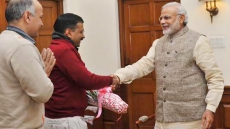As the right leaning politics gains currency globally, it is a good opportunity for us to reflect on the Guru’s call and question; as a part of Khalsa commonwealth, who do we serve and align with?
Vaisakhi 2019 seems special. After a gap of 72 years, Kartarpur and Dera Baba Nanak appear to be within sight of each other. Decades of ardas by the sangat seem to have been finally answered. However, the Kartarpur corridor talks had hardly begun, when a convoy of Indian forces was attacked in Jammu and Kashmir, killing 40 soldiers, and bringing the two nations on the brink of a war. The Indian media played hawkish nationalistic sentiments on the loop. The project started looking farfetched and the fear of war loomed large, with Panjab being at the center of this conflict on both sides of the border. Even after de-escalation, cross border firing continues as always, regularly killing soldiers on both sides, most of whom are economically poor.

Another time, another scene. A film named Kesari was released in India on March 21, based on the exemplary valor and sacrifice of 21 Sikhs from the 36th Sikh regiment of the British Army, in the Battle of Saragarhi (September 12, 1897), against thousands of Pashtun Orakzai tribesmen, in the now NWFP, Pakistan. The episode is considered to be one of the greatest last-stands. A primarily territorial battle between the British and the Pashtun tribes was softly projected as a contest between Sikhi and Islam, without explicitly saying so, like many other historical encounters of the Sikhs with the Muslim rulers.
Undermining the autonomy of the Sikh politics, time and again Sikh history is milked to serve the current majoritarian political interests in the Indian-subcontinent. With their fading power, Sikhs have also lost their agency, and narrative.

Glimpses of this malaise are visible in the diaspora also. Take for example the good intentioned “We Are Sikhs” campaign by the National Sikh Campaign (NSC), a couple of years ago, arguing that Sikh values are American values, even after decades of US invasions of sovereign states, and the continuous profiling and killing of people of colour domestically. Contours of this racial politics have become even more pronounced with a war on immigrants. Thus, such campaigns unwittingly allow themselves to be coopted by the majoritarian politics. Turbans coloured red, white and blue start looking not so etched in Sikh values after all.

These issues are deep down linked to the central question of:
What does the Khalsa stand for?
What are the Khalsa ideals?
Who does the Khalsa serve?
It is pertinent here to visit early Sikh tradition through Gurbani and history, and see what principles guided It.

The Guru informs us:
Some allied with friends, children and siblings;
some allied with in-laws, their relatives.
Some with selfish motives allied with elite leaders.
My alliance is with the All-Pervading Reliever. 1.
I have allied with the Reliever, Reliever is my support.
To me there is no side or alliance other than the Reliever;
I sing infinitely many virtues of the Reliever. Pause. …
In the illusion of the other love, people make alliance.
Searching for others’ fault, individual only feeds self-ego.
As one sows, so does s/he reap.
The alliance of servant Nanak is entirely the Reliever’s support,
by which whole world is overcome. 5.
Guru Ramdas Sahib, 366

Khalsa inaugurated at Anandpur was clearly rooted in this consciousness. The Khalsa character celebrated in the secondary text very much compliments the Sabad in this regard. The lovers drenched in Divine devotion defined as Khalsa (p. 655) seamlessly compliments the individual drenched in Self-taste as the epitome of Khalsa (Sarabloh Granth).
Guided by this principle, Guru Nanak Sahib, at the outset, proclaimed association with the most oppressed class.
Among the lowest of the low caste, I am the lowliest of the absolutely low.
Nanak seeks their company, why compete with the elite?
Where the lowly are cared for, there is the glance of Your grace!
Guru Nanak Sahib, 15

He exposed the hypocrisy of the religious elite, and openly challenged the rulers, Mughal emperor Babar being one example. From here arose the celebrated tradition of contrasting the rebellious Divine lovers as Babe Ke (of the Baba Nanak) with Babar Ke (of the Babar), representing the ruling class.
Additionally, langar (community kitchen) had also started undermining the caste system that the brahmins very much rued. By the time of Guru Amardas Sahib, this resentment turned hostile, when the brahmins complained to Akbar about langar destroying caste purity and hierarchy, one of his courtiers, Birbal, himself being a brahmin celebrated by the current caste elites.
The Sikh character of countering the ruling class in favor of the oppressed continually bothered the ruling elite. They were particularly incensed by the inauguration of Khalsa by Sahib Guru Gobind Singh. It is not without reason that majority of the battles fought by the Guru were against the Rajput hill chiefs, who later joined forces with the Mughals to attack the Guru.

Documenting the instructions of Sahib Guru Gobind Singh, Bhai Nand Lal (court poet of 10th Nanak) clearly marks the political character of Khalsa. He informs that Khalsa is the one who adorns arms, mounts steed, campaigns incessantly, protects the poor and annihilates the oppressor. Khalsa is also proclaimed as the sovereign rule of the Divine (Tankhahnama).

This description of Khalsa being sovereign, principle centered, anti-establishment and pro-oppressed, assumes great significance, in the face of still prevailing abject poverty, extremely skewed power balance and caste oppression. Take for example regular killings of lower castes even today, just for riding a horse, which is considered to be a sign of power assertion and rebellion. In this context, wearing of arms and mounting horses by the Khalsa were not only considered symbols of defiance, but also sovereignty.
As the right leaning politics gains currency globally, it is a good opportunity for us to reflect on the Guru’s call and question; as a part of Khalsa commonwealth, who do we serve and align with?

ABOUT THE AUTHOR
Surender Pal Singh works at the Sikh Research Institute, where he instructs online Gurbani courses on language and theology. Additionally, he conducts research for curriculums, presentations, and research papers on Sikh culture and history, and is the lead instructor for Gurbani 101 at the annual Sidak leadership program.



